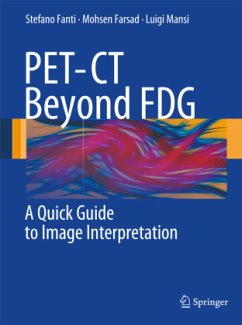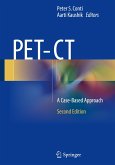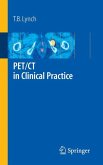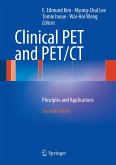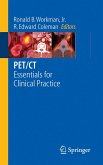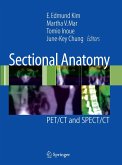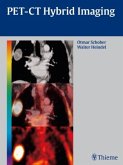This user-friendly guide to PET-CT imaging beyond FDG covers a wide range of non-FDG tracers. It contains almost 500 high-quality images and emphasizes image interpretation throughout, offering guidance on recognizing normal, benign and malignant.
Although [18F]fluorodeoxyglucose (FDG) generally shows an excellent performance as a cancer-imaging agent when using PET-CT, there are some settings in which other radiopharmaceuticals offer advantages. Such non-FDG tracers are now gaining widespread acceptance not only in research but also in clinical practice. This atlas, including about 500 high-quality images, is a user-friendly guide to PET-CT imaging beyond FDG. A wide range of tracers is covered, such as 18F- and 11C-choline, 11C-methionine, 18F-ethyl-L-tyrosine, 68Ga-DOTA-NOC, 11C-acetate, 11C-thymidine, and 18F-DOPA. Throughout, the emphasis is on image interpretation, with guidance on the recognition of normal, benign, and malignant uptake and clear instruction on learning points and pitfalls. This atlas is designed to serve as a reference text for both nuclear physicians and radiologists, and will also be of great benefit to radiographers, technologists, and nuclear medicine and radiology residents.
Although [18F]fluorodeoxyglucose (FDG) generally shows an excellent performance as a cancer-imaging agent when using PET-CT, there are some settings in which other radiopharmaceuticals offer advantages. Such non-FDG tracers are now gaining widespread acceptance not only in research but also in clinical practice. This atlas, including about 500 high-quality images, is a user-friendly guide to PET-CT imaging beyond FDG. A wide range of tracers is covered, such as 18F- and 11C-choline, 11C-methionine, 18F-ethyl-L-tyrosine, 68Ga-DOTA-NOC, 11C-acetate, 11C-thymidine, and 18F-DOPA. Throughout, the emphasis is on image interpretation, with guidance on the recognition of normal, benign, and malignant uptake and clear instruction on learning points and pitfalls. This atlas is designed to serve as a reference text for both nuclear physicians and radiologists, and will also be of great benefit to radiographers, technologists, and nuclear medicine and radiology residents.
From the reviews:
"The objective was to contribute the best efforts in the stimulating area of clinical development in nuclear medicine, with an emphasis on image interpretation by recognition of normal, benign, and malignant lesions and clear instructions on learning points and pitfalls. ... I highly recommend this book--a user-friendly guide to PET/CT beyond 18F-FDG--to nuclear physicians, radiologists, and researchers in oncology as well as to trainees in the imaging field." (E. Edmund Kim, The Journal of Nuclear Medicine, Vol. 51 (9), September, 2010)
"The atlas currently reviewed keeps a fresh though incisive approach to different PET/CT tracers that are gaining interest in routine clinical practice ... . This user-friendly atlas is not only helpful for young nuclear medicine physicians getting acquainted with new tracers, but also for more experienced colleagues needing a reference or searching for a focused analysis of non-FDG tracers. ... It offers useful background to build up the 'personal atlas' of professional experience: a book that should be available in university libraries and reporting rooms." (Giovanna Pepe and Arturo Chiti, European Journal of Nuclear Medicine and Molecular Imaging, Vol. 37, 2010)
"The objective was to contribute the best efforts in the stimulating area of clinical development in nuclear medicine, with an emphasis on image interpretation by recognition of normal, benign, and malignant lesions and clear instructions on learning points and pitfalls. ... I highly recommend this book--a user-friendly guide to PET/CT beyond 18F-FDG--to nuclear physicians, radiologists, and researchers in oncology as well as to trainees in the imaging field." (E. Edmund Kim, The Journal of Nuclear Medicine, Vol. 51 (9), September, 2010)
"The atlas currently reviewed keeps a fresh though incisive approach to different PET/CT tracers that are gaining interest in routine clinical practice ... . This user-friendly atlas is not only helpful for young nuclear medicine physicians getting acquainted with new tracers, but also for more experienced colleagues needing a reference or searching for a focused analysis of non-FDG tracers. ... It offers useful background to build up the 'personal atlas' of professional experience: a book that should be available in university libraries and reporting rooms." (Giovanna Pepe and Arturo Chiti, European Journal of Nuclear Medicine and Molecular Imaging, Vol. 37, 2010)

